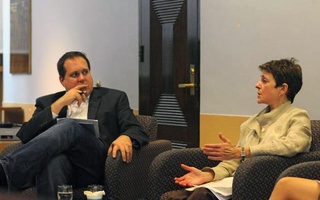A South African diplomat whose visit to Harvard in May sparked an anti-apartheid demonstration-turned-scuffle said yesterday he would decline a Harvard invitation to recount the incident before the faculty committee charged with disciplining the protesters.
Professor of Astronomy Owen J. Gingerich, a member of the disciplinary Committee on Rights and Responsibilities (CRR), said the committee will send the diplomat a letter within two weeks asking him to describe the protest, in which about 200 students blocked his exist from the Lowell House Junior Common Room after he had addressed members of the Harvard Conservative Club.
New York City Consul General for South Africa Abe S. Hoppenstein said he will neither appear before nor send written testimony to the CRR because he does not "want to get involved in domestic matters."
Hoppenstein said, however, that he feels Harvard administrators and police handled the incident "properly," despite protesters' charges that police officers were unnecessarily violent when they escorted Hoppenstein through the human blockade.
About 20 students involved have filed charges of police
brutality with a special University committee. At least two students--but not Hoppenstein--were injured in the fray.
Marathon
In marathon sessions last month the committee heard preliminary testimony from Harvard administrators and other witnesses to determine the general chain of events. When it next convenes in September the CRR will attempt to resolve some of the smaller discrepancies between the various accounts, said CRR chairman Richard E. Kronauer.
The committee will also ask students to appear for individual hearings, but it is unclear how many will comply. In the first round of hearings last month, all but one of the 14 protesters charged in the incident boycotted the hearings, saying the committee is "illegitimate" and was created to stifle political dissent.
No Testimony
Hoppenstein said he is confident that the CRR can reach a fair verdict without his testimony. He added that his account would agree with previously published accounts of the incident.
He refused to say whether the committee had been in contact with him about the incident.
Calling the blockade "an unpleasant event not becoming Harvard," Hoppenstein said he is "disturbed that students should be able to determine who speaks on campus."
The diplomat denied charges that the Conservative Club had provoked protesters by engaging him in a speech to which they were not invited. "I'm certain if protesters hadn't tried to bar my entry the leadership of the Conservative Club would have admitted them," the diplomat said.
"The protesters came not to listen but to wreak havoc," Hoppenstein added. "I would have gladly heard them and fielded their questions."
Read more in News
Harvard, Widow Mourn Murdered Filipino LeaderRecommended Articles
-
Fundraising, Not FrustrationT HE CAMPUS anti-apartheid movement has become bogged down in the politics of divestiture, and it's time for committed members
-
Over the WireBERLIN (Monday)--German bombing planes, tightening a "starvation blockade" of the British Isles, have sunk 11 ships totalling 61,000 tons in
-
 Harvard History Professor Testifies in Proposition 8 Case
Harvard History Professor Testifies in Proposition 8 Case -
Kirkland Trial Day 6: Officers, Forensic Experts Discuss Physical EvidenceThe second week of Jabrai Jordan Copney’s murder trial opened yesterday with a full day of testimony that focused heavily on forensic evidence.
-
 Profile: Nancy F. Cott
Profile: Nancy F. Cott -
The Face That Launched A Thousand TweetsThe response to Rachel was unsettling not only because it was offensive, but also because it reinforces prejudiced beliefs of what type of person deserves respect in this country.













